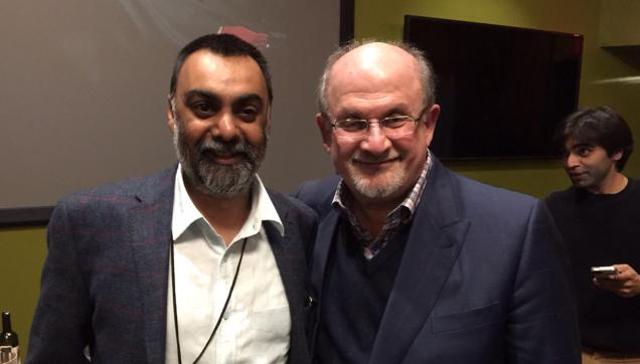|
| |
SECOND ANNUAL IAAC LITERARY FESTIVAL
in collaboration with Hunter College, CUNY, 625 Park Ave, NYC
OCTOBER 22-25, 2015 |
| Reviews |
hindustantimes.com
Punjabi By Nature: New York Diary
Khushwant Singh, Hindustan Times | Updated: Nov 01, 2015 |
| |

Writer Khushwant Singh with author Salman Rushdie. |
Each time I board a long distance flight, I curse myself. A Scotch or two down in the skies and I get angry at myself further to the point of questioning the journey itself. Why the hell am I undertaking this uncomfortable journey, I tend to ask myself, as the cramped space of the economy class takes me to a point where I want to jump out of the plane.
And it is always during such moments that I lament being a writer and not a businessman, a corporate honcho or a politician, who get to sprawl themselves on that first class chair, giving two hoots to fellow humans herded in the ‘cattle class’. Bloody middle class, they seem to be saying when you cross those mid-air beds to your allocated rows of seats.
With this feeling, I finally landed in the US (on Nov 20) for a literature festival organised by the Indo-American arts council, where my novel Maharaja in Denims was being showcased as part of a panel on historical fiction from the subcontinent.
‘Bloody expensive proposition, and hope it’s worth it,’ I said to myself as I marched into the venue at Hunter College, New York, for the first session. It was the launch of actor and food and travel writer Madhur Jaffrey’s book on vegetarianism. An eloquent lady, everyone listened to her in rapt attention, including a strict non-vegetarian like me who looks with contempt at the veggie brigade just like the first class passengers do at the cattle class.
What I took away from Jaffery’s session, for which I flew all the way to New York, was that the most authentic Indian food is cooked at home and what you get in restaurants is hardly the real stuff. The other thing I learnt was how the concept of ‘thali’ came into being. According to her, it was invented by the Hindu community to prevent ‘jootha’ food to get into their plates, unlike the brotherhood among other communities where they ate from a common bowl.
Day two was the big day, the session between Salman Rushdie and Suketu Mehta, author of Maximum City. Titled Bombay Boys in New York, the session by the two enthralled the audience with humour and wit. The session soon veered towards the topic of growing intolerance in India with Rushdie asking why the most talkative Prime Minister India has ever had has nothing to say on the growing attacks on the freedom of expression.
Talking on the sidelines of the event, Rushdie said since Nayantara Sahgal was being targeted for bringing into focus the growing intolerance in India, it was his duty to support her as as well as the authors who had returned their awards. He said he was happy that the Sahitya Akademi had finally shown some grit and come out with a bold statement in support of the authors.
The third day was for lesser mortals like us and I read from my book Maharaja in Denims (MID). Along with me on the panel were authors Sudipto Roy Chaudhry and Manreet Sodhi Someshwar, whose book The Long Walk Home is also set in Punjab.
The passage from MID on the 1984 anti-Sikh riots not only brought to focus the violent rioting history of India, but threw open a discussion on Punjab, its tumultuous past, present and future. One important conclusion of the panel was the significance of Punjab’s contemporary tragic story finding place in the fictional narrative. Jerry Fischer, executive director of the Jewish federation of the East Connecticut, who was part of the audience, validated this important development.
He said one of the reasons that the tortures of the Jewish Holocaust penetrated public memory was because they became part of storytelling in novels. To the journalists who asked me about Punjab, this is what I said: “Governments, which will invest their energy only in religion and its own cadres and not education and its citizenry, will always bring Punjab to the brink.”
Soon I’ll be on a plane back home with an eye on the upcoming Sangrur Literature festival.
Email the writer at singhkhushwant@hotmail.com |
| URL: http://www.hindustantimes.com/punjab/punjabi-by-nature-new-york-diary/story-7CUnh7ALUfaQzyzcXMkHfO.html |
| |
|
|

